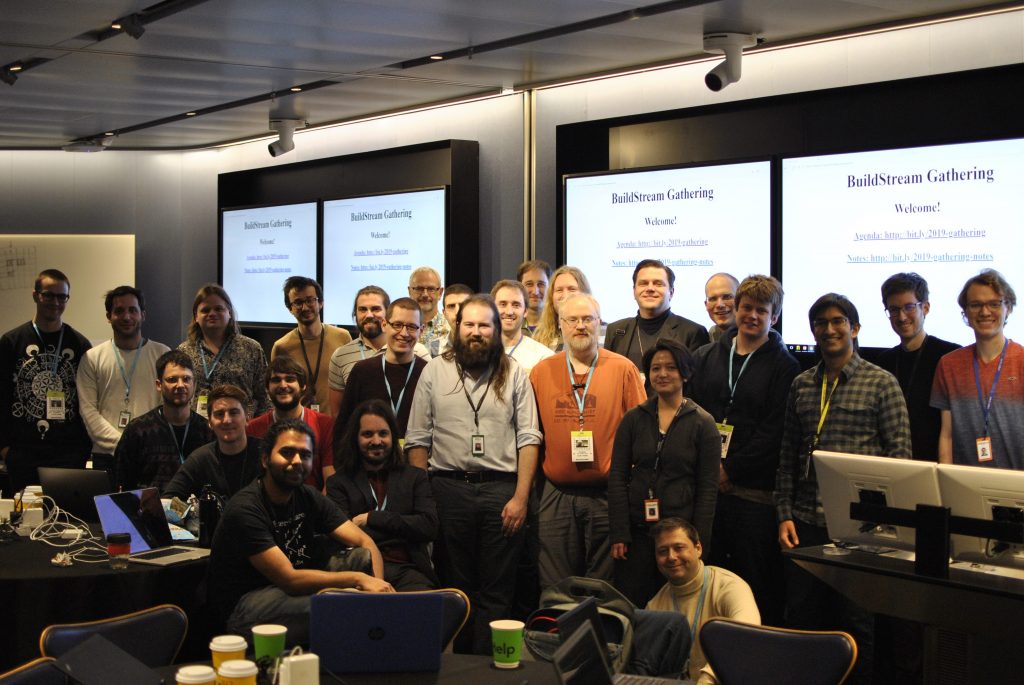Hi all,
It has been a very long time since my last BuildStream related post, and there has been a huge amount of movement since then, including the initial inception of our website, the 1.2 release, the beginnings of BuildGrid, and several hackfests including one in manchester hosted by Codethink, and another one in London followed by the Build Meetup which were hosted by Bloomberg at their London office.

As a newyears resolution, I should make a commitment to blogging about upcoming hackfests as soon as we decide on dates, sorry I have been failing at this !
Build Meetup
While the other BuildStream related hackfests were very eventful (each of them with at least 20 attendees and jam packed with interesting technical and planning sessions), the Build Meetup in London is worth a special mention as it marks the beginnings of a collaborative community of projects in the build space.
Developers of Bazel, BuildStream & BuildGrid and Buildbarn (and more!) united in London to discuss our wide variety of requirements for the common remote execution API specification, had various discussions on how we can improve performance and interoperability of our tooling in distributed build scenarios and most importantly; had an opportunity to meet in person and drink beer together !
BuildStream 2.0 planning
As some may have noticed, we did not release any BuildStream 1.4 in the expected timeframes, and the big news is that we won’t be.
After much deliberation and hair pulling, we have decided to focus on a new BuildStream 2.0 API.
Why ?
The reasons for this are multifold, but mainly:
- The project has received much more interest and funding than anticipated, as such we currently have a staggering amount of contributors working full time on BuildStream & BuildGrid combined. Considering the magnitude of features and changes we want to make, committing to a 6 month stable release cycle for this development is causing too much friction.
- A majority of contributors would prefer to refine and perfect the command line interface than to commit to the interface we initially had, and indeed the result after adding new functionality will be more comprehensive and intuitive as a result. The result of these changes will not however be backwards compatible.
- With a long term plan to make it easier for external plugins to be developed, along with a plan to split out plugins into more sensible separate repositories, we also anticipate some API breakages to the format related to plugin loading which cannot be avoided.
To continue with the 1.x API while making the changes we want to make would be dishonest and just introduce unexpected breakages.
What are we planning ?
Some highlights of what we are working on for future BuildStream 2.x include:
Remote execution support
A huge amount of the ongoing work is towards supporting distributed build scenarios and interoperability with other tooling on server clusters which implement the remote execution API.
This means:
- Element builds which occur on distributed worker machines
- Ability to implement a Bazel element which operates on the same build servers and share the same caching mechanics
- Ability to use optimizations such as RECC which interact with the same servers and caching mechanics
Optimizating for large scale projects
While performance of BuildStream 1.x is fairly acceptable when working with smaller projects with 500-1000 elements, it falls flat on its face when processing larger projects with ~50K elements or more.
New commands for interacting with artifacts
For practical purposes, we have been getting along well enough without the ability to list the artifacts in your cache or examine details about specific artifacts, but the overall experience will be greatly enriched with the ability to specify and manipulate artifacts (rather than elements) directly on the command line.
Stability of artifact cache keys
This is a part of BuildStream which was never stable (yet), meaning that any minor point upgrade (e.g. from 1.0 -> 1.2) would result in a necessary rebuild of all of a given project’s artifacts.
While this is not exactly on the roadmap yet, there is a growing interest in all contributing parties to make these keys stable, so I have an expectation that this will stabilize before any 2.0 release.
Compatibility concerns
BuildStream 2.x will be incompatible with 1.x, as such we will need to guarantee safety to users of either 1.x or 2.x, probably in the form of ensuring parallel installability of BuildStream itself and ensuring that the correct plugins are always loaded for the correct version, and that 1.x and 2.x clients do not cross contaminate eachother in any way.
While there are no clear commitments about just how much the 2.x API will resemble the 1.x API, we are committed to providing a clear migration guide for projects which need to migrate, and we have a good idea what is going to change.
- The command line interface will change a lot. We consider this to be the least painful for users to adapt to, and as there are a lot of things which we want to enhance, we expect to take a lot of liberties in changing the command line interface.
- The Plugin facing Python API will change, we cannot be sure how much. One important change is that plugins will not interact directly with the filesystem but instead must use an abstract API. There are not that many plugins out in the wild so we expect that this migration will not be very painful to end users.
- The YAML format will change the least. We recognize that this is the most painful API surface to change and as such we will try our best to not change it too much. Not only will we ensure that a migration process is well documented, but we will make efforts to ensure that such migrations require minimal effort.
We have also made some commitment to testing BuildStream 2.x on a continuous basis and ensuring that we can build the freedesktop-sdk project with the new BuildStream at all times.
Schedule
We have not committed to any date for the 2.0 release as of yet, and we explicitly do not have any intention to commit to a date until such a time that we are comfortable with the new API and that our distributed build story has sufficiently stabilized. I can say with confidence that this will certainly not be in 2019.
We will be releasing development snapshots regularly while working towards 2.0, and these will be released in the 1.90.x range.
In the mean time, as far as I know there are no features which are desperately needed by users at this time, and as long as bugs are identified and fixed in the 1.2.x line, we will continue to issue bugfix releases.
We expect that this will provide the safety required for users while also granting us the freedom we need to develop towards the new 2.0.
FOSSASIA 2019
Often, a conference is an opportunity to visit exotic and distant locations like Europe, and maybe we forget to check out the exciting conferences closer to home.
In this spirit, I will be giving another BuildStream talk at FOSSASIA this year. This conference has been running strong since 2009, takes place in Singapore and lasts four days including talks, workshops, an exhibition and a hackathon.
I’m pretty excited to finally see this for myself and would like to encourage people to join me there !


Exciting stuff !! nice photo 🙂
Hi! How can I run gnome-shell built on buildstream? It isn’t supported yet?
Hi Márcio,
BuildStream has support for running applications in the sandbox using the `bst shell` command, but this is not particularly useful for running gnome-shell (I suppose one could experiment, but it will be hacky and your mileage will probably vary depending on how closely your host system resembles the dependencies in the sandbox).
That said, I am currently working on building VM images of the latest GNOME stack which will allow one to edit/compile/test the entire system.